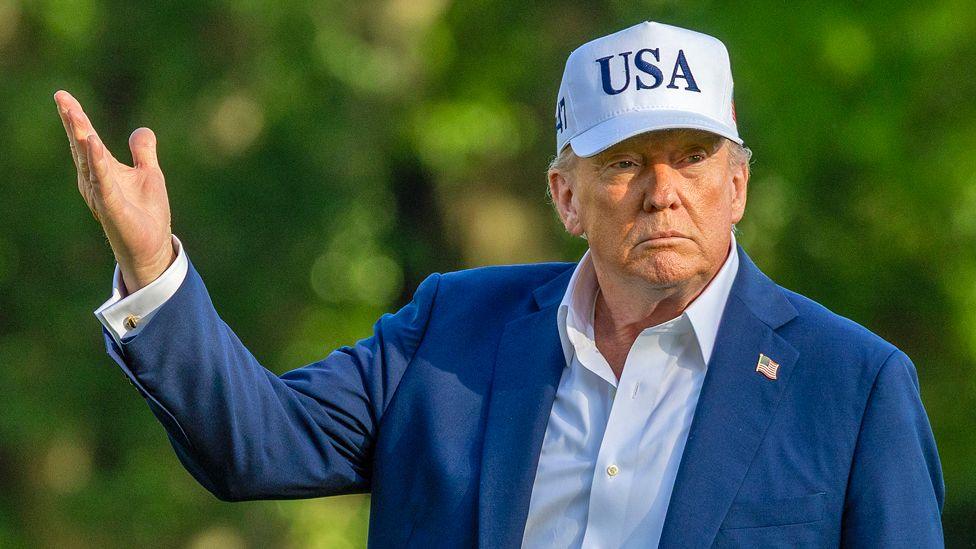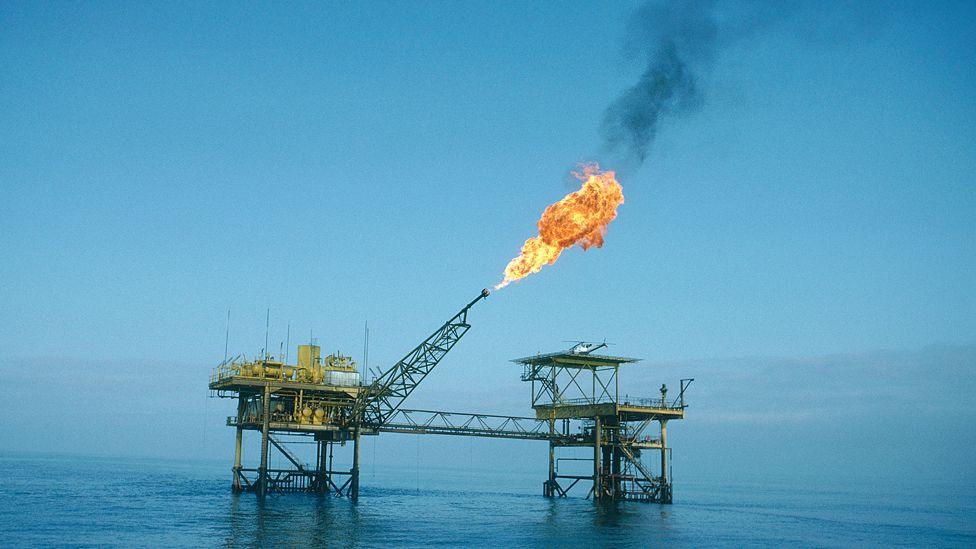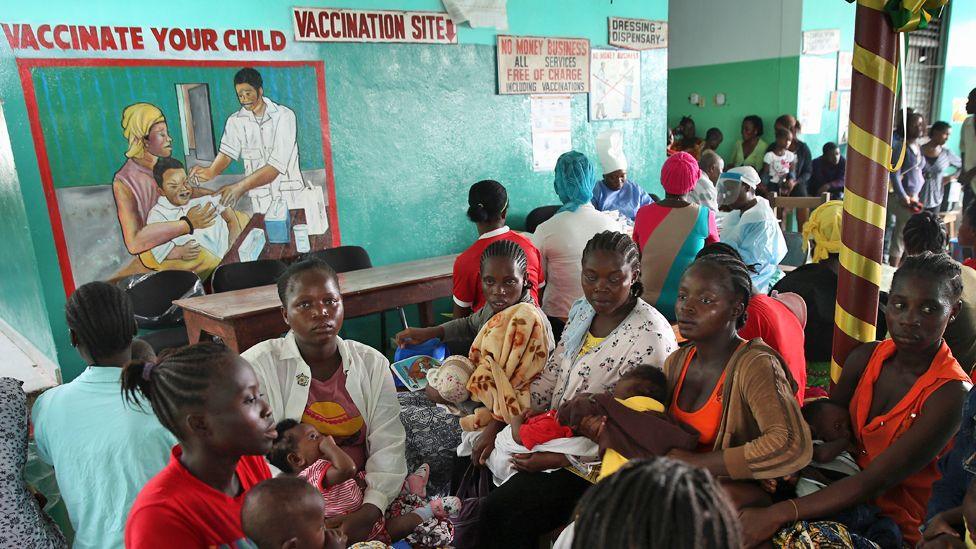Why Trump invited five African leaders to the White House

Donald Trump wants to do business in Africa - and is not interested in aid
- Published
US President Donald Trump began a three-day summit in Washington DC with the leaders of five African states, an event the White House sees as an "incredible" commercial opportunity.
Trump's guests include the leaders of Gabon, Guinea-Bissau, Liberia, Mauritania and Senegal - all countries with small populations and economies.
The meetings are expected to concentrate on Trump's "trade, not aid" policy and with all of them facing 10% tariffs on goods exported to the US, they may be hoping to do deals to negotiate this rate down.
During a televised lunch at the White House on Wednesday, the African leaders lavished Trump with praise while encouraging US economic partnership.
Seated diagonally from Trump across a long wooden table, Mauritania President Mohamed Ould Ghazouani was the first African leader to speak.
"In the short time you've been back in office, the last few months you came to the rescue for peace," Ghazouani said.
"You rushed to Africa to resolve a longstanding problem," he continued, referring to a peace deal between DR Congo and Rwanda facilitated by the White House.
His remarks were echoed by the other African state leaders, most of whom made direct comments in support of Trump being nominated for a Nobel Peace Prize.
Watch: Trump praises Liberian president's English, the country's official language
Senegal President Bassirou Diomaye Faye complimented his golf skills, inviting him to build a golf course in Senegal.
"Thank you very much. Very nice. Thank you. I didn't know I'd be treated this nicely. This is great," Trump responded. "We could do this all day long."
The African state heads also used the platform to talk about their respective natural resources and raw materials, including rare earth minerals. Some made direct appeals to US investors and the president.
Faye spoke about the prospect of building a "tech city" in Dakar with "views of the sea", and said: "I would like to invite American investors to take part in this".
Gabon President Brice Clotaire Oligui Nguema said his country has "a great deal of resources", including rare earth minerals.
"You are welcome to come and invest, otherwise other countries might come instead of you," Nguema said.
Senegal's former ambassador to Washington, Babacar Diagne, said the invitations to the African leaders reflected the recent "paradigm shift" in US policy towards the continent.
After taking office in January for his second term, Trump cut US aid to the continent, saying it was wasteful and incompatible with his "America First" policy.
With Trump and the Republican Party at the helm, there is also doubt about whether the US will renew later this year its African Growth and Opportunity Act (Agoa), which guarantees duty-free access for certain goods from Africa.
"It's not like before with the Democrats. There were two strong points with them: poverty reduction and development issues, through Agoa and other initiatives. All that is over," Mr Diagne told the BBC.
According to the former diplomat, the Trump administration's position will mirror how it has dealt with Ukraine war-time leader Volodymyr Zelensky.
"Pure trade. It's give and take, win and win. We saw it with Ukraine. You sign the agreement on minerals and you'll have us on your side, otherwise, you forget everything," Mr Diagne said.
Last month's peace deal signed in Washington between Rwanda and the Democratic Republic is a case in point - trade diplomacy that will potentially see the US gain lucrative mineral access.
Indeed Nicaise Mouloumbi, head of a leading non-governmental organisation in oil-rich Gabon, said the Trump administration's focus on Africa was down to increasing competition from rival powers - including China and Russia - for its prized resources.
"All these [invited] countries have important minerals: gold, oil, manganese, gas, wood and zircon - Senegal, Mauritania and Gabon, in particular," he told the BBC.
Gabon holds around a quarter of the global known reserves of manganese - and it provides 22% of China's of the mineral, which is used in the production of batteries and stainless steel.

Oil-rich Gabon intends to shift towards deep-water exploration and production in future
Mr Mouloumbi added that the US might be most keen to strengthen ties with Gabon not only because it had "strategic" minerals like manganese and uranium, as well as oil, but also because it was strategically located along the Gulf of Guinea, with a coastline of about 800km (500 miles).
It could host a US military base that America plans to build in the region, Mr Mouloumbi said.
Mr Diagne made a similar point about piracy, saying that "maritime terrorism in the Gulf of Guinea has become an extremely important issue" for the US.
Many tankers carrying oil and gas travel through the Gulf of Guinea, which has been known as a piracy hot spot for several years.
For Mauritania and Senegal, migration will be central to discussions, according to Ousmane Sene, the head of the West African Research Centre (WARC),
"Let's not forget that between 2023 and 2025, no fewer than 20,000 young Mauritanians left for the US via Nicaragua, along with hundreds of young Senegalese," the analyst told the BBC.
"All these countries are also departure points for illegal emigration," he added.
"That's an extremely important point in his [Trump's] migration policy, and every day people are turned back at the borders."
Mauritania is the only one of the five countries that does not have diplomatic ties with US ally Israel - cutting them in 2009 over an offensive in Gaza - and sources have told Semafor, external that restoring them may be a sticking point for any would-be White House deal.
Visa overstay rates are another issue to be settled - especially for Gabon and Liberia, which both have higher ones than Burundi, which last month became subject to US travel restrictions with visa overstays cited as a key reason.

Liberia's health system is fragile - and before Trump, US funding accounted for 48% of its budget
Liberia may also be considering a US proposal to accept people deported by the US, including criminals. The country, which has close historical links to America, was reportedly included on a proposed list of countries that the US had approached.
The country, which was brought to its knees by a 14-year civil war and then the devastating Ebola epidemic of a decade ago, is in desperate need of cash as it has been severely affected by US aid cuts.
In particular the impact has been felt by its fragile health system, which had relied on US funding for 48% of its budget.
Guinea-Bissau, which has suffered a series of coups and attempted coups over the years, is reportedly keen for the US embassy to reopen in the capital, Bissau, following its closure after the army mutinied in 1998.
President Umaro Cissoko Embaló was clearly proud of the White House's invite for Guinea-Bissau, which several years ago was labelled a "narco-state" by the US and UN as it was once a major transit hub for cocaine from Latin America to Europe and North America.
"Guinea-Bissau has now emerged from a state of disorder to become a real state. The Americans do not invite just any state to their country - only a well-structured state," he was quoted as saying at the airport before he left for Washington.
He and his counterparts - Brice Clotaire Oligui Nguema of Gabon, Joseph Boakai of Liberia, Mohamed Ould Ghazouani of Mauritania and Bassirou Diomaye Faye of Senegal - will be hoping they hold some cards to do a deal with Trump.
They certainly do not want a replay of May's infamous high-stakes meeting between South Africa President Cyril Ramaphosa and Trump in the Oval Office, which did little to ease relations.
In fact, it seems to have completely backfired as this week Africa's biggest economy found out that from next month its exports to the US are being slapped with a 30% tariff.

You may also be interested in:

Go to BBCAfrica.com, external for more news from the African continent.
Follow us on Twitter @BBCAfrica, external, on Facebook at BBC Africa, external or on Instagram at bbcafrica, external
BBC Africa podcasts
- Attribution